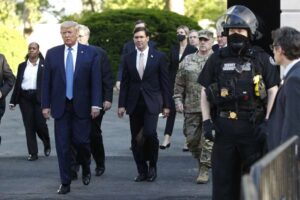U.S. Army Gen. Mark Milley, chairman of the Joint Chiefs of Staff, has been bitten by the military honor bug and his reaction to it might incur the wrath of the commander in chief.
To which I say … good for you, Gen. Milley.
The general says now he regrets taking part in that ridiculous photo op staged by Donald Trump in which he walked to St. John Episcopal Church to hold up a Bible. He was accompanied on that stroll by Defense Secretary Mark Esper and Gen. Milley, who was dressed in combat fatigues.
Milley said today his presence at the photo op interjected the military into a political scene, which is anathema to the military’s mission. The episode was centered on protests over racial injustice by local police departments. Trump thought he’d respond to it by prancing over to the church and holding up a Bible in a ridiculous display of phony religiosity.
As The Associated Press reported: He said his presence in uniform amid protests over racial injustice “created a perception of the military involved in domestic politics.”
There you have it. The battle-tested veteran realizes that he erred in taking part in a stupid political stunt. What’s more, and this could get tricky, is that he well might draw incoming fire from Nimrod in Chief who dislikes any form of criticism from any quarter. When, then, will Donald Trump do? Is he going to “fire” the Joint Chiefs chairman for standing on principle?
Well, he’s done something like that before. Such as when he fired Attorney General Jeff Sessions for recusing himself from the Russia “thing”; or when he fired Defense Secretary James Mattis for disagreeing with Trump on Middle East policy; or when he fired Secretary of State Rex Tillerson for challenging Trump’s policy decisions on the basis of whether they were lawful; or when he fired FBI Director James Comey for refusing to declare total loyalty to Trump.
Gen. Milley shouldn’t lose his job over his expression of regret. Then again, Donald Trump shouldn’t even be in a position to decide how to respond to the statements of an honorable soldier and patriot.


